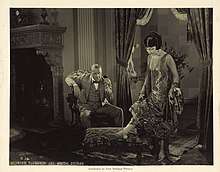Torment (1924 film)
Torment is a 1924 American silent film crime drama produced and directed by Maurice Tourneur and distributed by Associated First National. This film stars Bessie Love, Owen Moore, and Jean Hersholt. The film is based on a story by William Dudley Pelley with script by Fred Myton and titles by Marion Fairfax. It is a lost film.[5][6]
| Torment | |
|---|---|
 Publicity photograph | |
| Directed by | Maurice Tourneur Scott R. Beal (assistant director) |
| Produced by | Maurice Tourneur M. C. Levee |
| Written by | Fred Myton (scenario) Marion Fairfax (intertitles) |
| Based on | "Torment" (story) by William Dudley Pelley[1] |
| Starring | Bessie Love Owen Moore Jean Hersholt |
| Cinematography | Arthur L. Todd |
| Edited by | Frank Lawrence |
Production company | Maurice Tourneur Productions[2] |
| Distributed by | Associated First National |
Release date |
|
Running time | 6 reels; 5,400 feet[4] |
| Country | United States |
| Language | Silent (English intertitles) |
Plot
Count Boris Romanoff (Hersholt), a modern-day Robin Hood, has stolen the Russian crown jewels with the intent of selling them and giving the proceeds to the poor. However, a group of thieves led by Hansen (Moore) learns of this plan, and plots to steal the jewels in Yokohama before they can be sold. On a ship to Japan, Hansen meets a maid named Marie (Love), who convinces him to change his ways.
While in Yokohama, an earthquake levels the city, killing the count, and trapping Hansen, his fellow thieves, and Marie in a bank vault. Hansen and Marie fall in love, and Hansen vows to follow through with the count's wishes.[4][7][8][9]
Cast
- Bessie Love as Marie
- Owen Moore as Hansen
- Jean Hersholt as Count Boris Romanoff
- Joseph Kilgour as Flint
- Maude George as Mrs. Flint
- Morgan Wallace as Jules Carstock
- George Cooper as Chick Fogarty
Production
A production crew filmed scenes in Russia and Japan, as well as the United States, so that the scenes that took place in those locales would have an authenticity.[10][11] The film also incorporated documentary footage of the 1923 Great Kantō earthquake.[4]
References
- Goble, Alan, ed. (September 8, 2011). The Complete Index to Literary Sources in Film. Walter de Gruyter. p. 363. ISBN 978-3-11-095194-3.
- Love, Bessie (1977). From Hollywood with Love: An Autobiography of Bessie Love. London: Elm Tree Books. p. 152. OCLC 734075937.
- "20 Pictures and 20 Release Dates". Motion Picture News. Vol. 29 no. 4. January 26, 1924. p. 355.
- Waldman, Harry (2001). "The Films in America, 1914–1926". Maurice Tourneur: The Life and Films. Jefferson, NC: McFarland & Co. p. 117. ISBN 978-0-7864-0957-0.
- Bennett, Carl (March 24, 2005). "Progressive Silent Film List: Torment". Silent Era.
- Munden, Kenneth W., ed. (1971). The American Film Institute Catalog of Motion Pictures Produced in the United States: Feature Films 1921–1930. New York: R.R. Bowker Company. pp. 822–3. OCLC 664500075.
- Motion Picture News Booking Guide. New York, NY: Motion Picture News. April 1924.
- "Crook Story with Big Punch". Exhibitors Herald. March 8, 1924.
- Shull, Michael Slade (September 3, 2015). "The Filmography, 1924–1925". Radicalism in American Silent Films, 1909–1929: A Filmography and History. McFarland. p. 264.
- "Studio and Player Brevities". Motion Picture News. November 24, 1923. p. 2475.
- "To Take 'Torment' Scenes in Three Countries". Motion Picture News. December 8, 1923. p. 2665.
External links
- Torment on IMDb
- Torment at AllMovie
- Torment at the American Film Institute Catalog
- Lobby poster